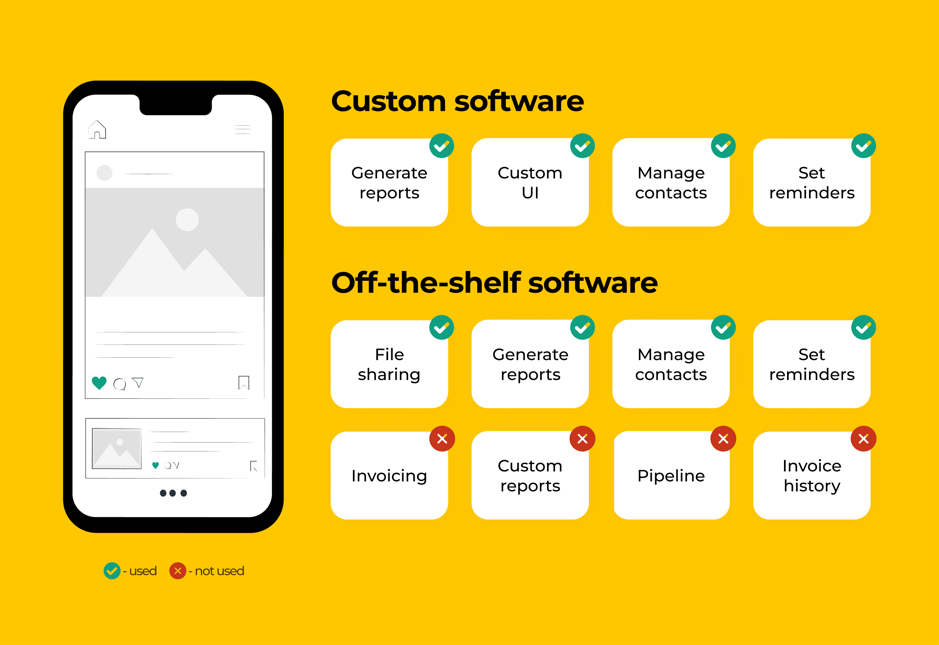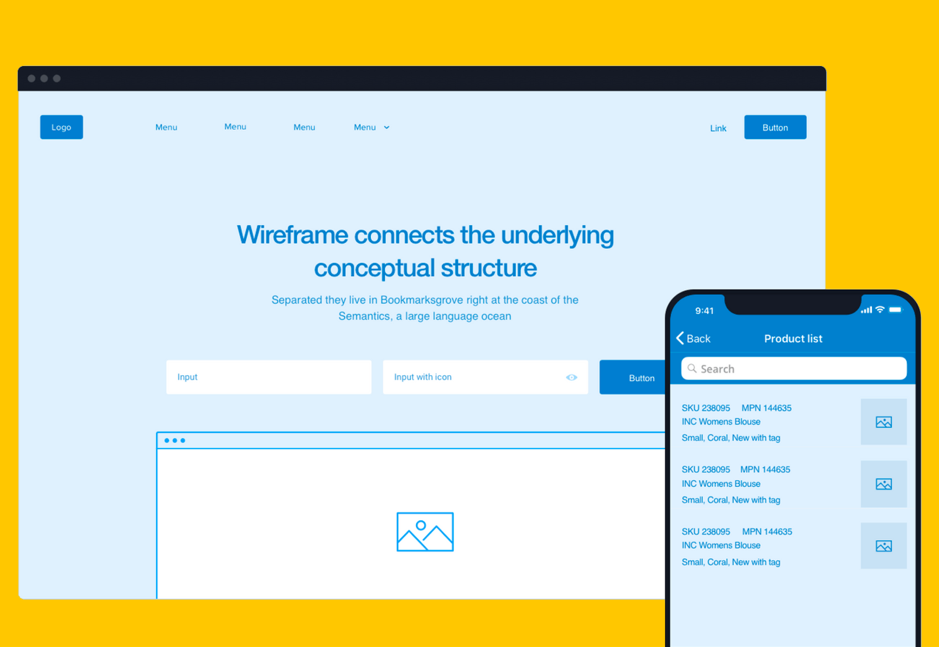Contents
There are two major currents in the sea of software development: custom and off-the-shelf. As it happens, these two branches do not compete but complement each other while filling different market gaps. Still, in this article, we will mainly focus on the custom division of the software development, along with the gap it aims to meet, and how to recognize the ad hoc need in your e-business.
Definition
Custom software stands for the one made individually according to the unique needs of certain e-business, which results in a personalized set of digital solutions. Each solution makes a target contribution to your digital product’s well-being, while together, they form a well-synchronized supporting system with the same goal in mind.
Today the word “custom” is often replaced with the word “bespoke,” which has its roots in the tailoring industry. Just like a fancy bespoke suit, bespoke software is created according to the unique measurements of a given web product. Clearly, these measurements are different from the chest width or the arm length.
Let’s take a look at the parameters of businesses taken into consideration when ordering bespoke software:
- Target audience
- Concept & Ethos
- Needs & Requirements
- Marketing strategy
- Market niche
What Is in It for You?
After the Covid-19 pandemics took a toll over both small and large businesses, companies had to think about a contactless way of fulfilling clients’ needs. An obvious answer was the IT sphere, and that is how a great migration of businesses to the digital realm has begun.
As a result, the IT sphere was among those few lucky ones that did not experience a decrease in client rate posed by the pandemic. Quite the opposite, the necessity to reorganize and digitize the workflow caused a surplus of customers which the IT sphere was not always able to handle. Currently, however, the industry has a sufficient number of eligible workforce and general aptitude to meet clients’ developmental needs.
And when it comes to locating your business in the digital realm, customer software is what comes in handy. Here is a short list of top needs that can be experienced by your business and fulfilled by bespoke software development:
- Remote work
- Modernization of the workflow
- Expansion to the e-commerce
- Need for a long-term marketing strategy
- Optimization and acceleration of supply chain processes
- Ability to trade internationally
If at least one of the above mentioned points sounds desirable for you, then tailored software solutions is what you should be up to.
Trends
So to make custom development more clear for you, we would like to consider it through a more practical perspective. Precisely, let’s take a look at trends that dominate the development field nowadays and shape its future.
- Hiring development vendors from other regions, regardless of its geographical location, place on the world map, but according to price and quality of the provided service is a new black of development trends. And to ensure maximum synergia in terms of deadlines, there is an option of nearshore software development, implying vendor’s location within 1-3 hour proximity.
- The impact of the blockchain spans far beyond cryptocurrency and other fintech related things. Instead, blockchain provides unprecedented security and transparency of processes to all kinds of infrastructures: logistics, agriculture, healthcare to name a few.
- Cross-platform development. Instead of spending time and bucks to create a native app for each platform, or experiencing the agony of choosing between iOS and Android, you can simply pick the all-in-one option.
- Upgrading legacy software.This trend mainly has to do with companies that already have software but it is outdated. Usually, a primary factor catalyzing the upgrades is incompatibility of the outdated software with more advanced services and products.
How Is Custom Software Different from Off-The-Shelf One?
Let’s now consider custom software development from a more practical perspective. To this end, let’s look at how it differs from the off-the-shelf development style via various development stages and aspects.

Features of custom and off-the-shelf software: not every feature of the latter is necessary.
Features
- With tailored software developers make a thorough analysis of your company specifics and create a custom package of on-demand solutions. No excessive services and products included, only solutions vital for the business engaged.
VS
- Off-the-peg software normally comes in packages consisting of basic digital solutions’ sets and is distributed as an independent product by large software providers (for example, Microsoft Office and Sitebuilder). Also, this software goes with features that you may not need but have to pay for anyway as they are included in the package.
Design
- Tailor-made design solutions are fully customizable, as designers create wireframes throughout the whole development process. Custom UI/UX is also convenient for the marketing strategy since it reflects your website or app’s authentic style and ethos. Inclusivity is also completely accessible with custom UI/UX and is reached by a preliminary analysis of your target audience, its needs, and pains. Finally, bespoke design is marked by equally high feasibility in both mobile and computer versions of your web product.
VS
- Off-the-shelf design uses pre-made design templates and patterns. Thus, chances to get an inclusive design meeting the needs of all your customers range from minimal to zero. The scalability of off-the-peg design solutions is low which hardens UI/UX switching between different devices.
Compatibility
- Custom software can be engaged in integrations with any third-party software without any problems.
VS
- Off-the-rack software demonstrates poor compatibility with third-party systems, which poses restrictions on integration with other services boosting workflow’s productivity.
Security
- When you go for a custom software, its security is fully up to the extent of efforts you put to ensure it. Besides, it takes additional finance investments and human resources to keep your software running protected from hacker attacks.
VS
- In case of store-bought software, security is granted by its provider, which means you don’t have to take additional steps and spend additional resources to ensure it.
Cost
- Financial investments are pretty serious when it comes to bespoke systems development. On the other hand, the cost only covers essential services, no excessive features or solutions to pay for.
VS
- Off-the-rack packages are great for start-ups as they do not imply critically impactful investments. However, the price is not customizable, i.e. you pay for all solutions included in the off-the-shelf package, not only the ones you truly need.
Time
- Bespoke development is a time-consuming process, normally taking months to reach the desirable result
VS
- With ready-made software solutions you do not spend time on development, and it only takes a minimal time to install the product.

Design wireframes in mobile and computer versions of the web product.
Thus, rather than offering you a limited set of measures to cover the most basic needs, custom software is capable of fulfilling your unique set of needs to the fullest extent.
Author’s bio:
Yuliya Melnik is a technical writer at Cleveroad. It is a web and mobile app development company in Ukraine. She is passionate about innovative technologies that make the world a better place and loves creating content that evokes vivid emotions.



